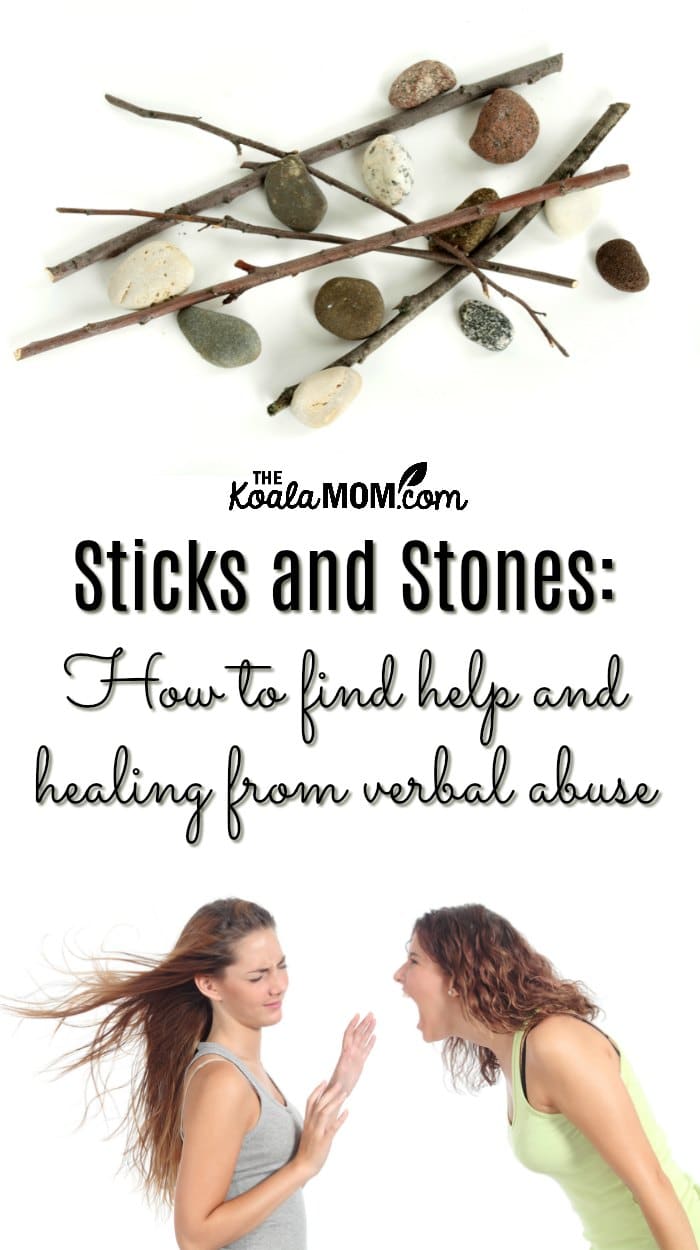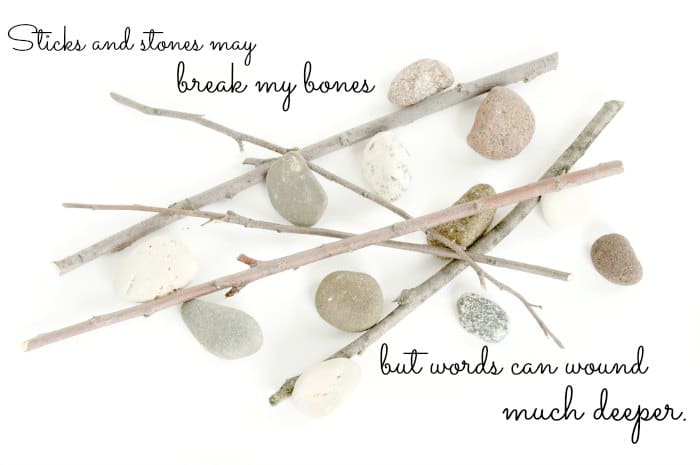There’s an old saying that “sticks and stones may break my bones, but words can never hurt me.” Maybe other old sayings are true, sources of time-refined wisdom, but that one isn’t. And that’s probably no surprise to you either. We can all think of times when someone said something that really hurt us, that we’ve never forgotten. Verbal abuse hurts.
Maybe, however, that saying reflects something else. Sticks and stones cause obvious hurts – broken bones can be seen. So can bruises and cuts and scrapes. Walk around like that and everyone will ask you what happened to you. Did you fall down the stairs? Run into a door?
The pain of verbal abuse – nobody sees that. When the pain comes, we can keep smiling, even if we’re crying inside. We might never let anybody see how their words affected us. We keep walking around, broken and bleeding, faking fine, but nobody knows. So how do we find help and healing from verbal abuse?

It’s Easy to Hide the Hurt of Words
Sometimes I sit on the bus, looking at the people crowded around me, talking on their cell phones or staring out the window or chatting with their seat mate, and wonder what they would look like if we could really see them, like God can. Would they still look so good, so polished, so happy? Or would they be broken and bleeding, cowering in fear, crying out for help?
In Frank E. Peretti’s novel Prophet, he tries to give us a glimpse of this. The main character is talking to his boss about a news story he wants to run on abortion. She’s hard, business-like, refusing to let him run the story. Then, like a prophet, he catches a glimpse of what’s really going on inside her. She’s cowering behind her desk, crying, because she had an abortion and has never healed from the pain. It’s that pain that causes her to react to him.
We see our friends or coworkers, ask them “How are you doing?” and get a typical, “Good, and you?” in reply. The phrase has become an empty greeting, meaningless. Nobody really wants to know how we are doing. I answered that question automatically once, on a day when I was hurting so much I was almost crying at work, and then thought ironically that I was anything but good.
Healing from Verbal Abuse: Name It
One of my friends sends me emails asking, “Really, how are you doing?” She knows when I need to do more than just answer “good” to that question. And sometimes it’s easier to answer that question via an email or text message, rather than speaking. If you aren’t doing fine, it can help to tell someone else. Name the verbal abuse that you are receiving. Even if they can’t help, sometimes just speaking the pain and having a sympathetic ear makes a big difference in how you feel about it.
We can also work on being the friend who asks, “How are you doing?” and really means it. If you know that a friend has suffered verbal abuse in the past, check in with him or her. Look at your friends closely to see how they are doing behind the words they are speaking. The same friend who emails me often also knows when I need a hug or a walk in the river valley. If you see that a friend is hurting, don’t walk away. Sometimes we don’t want to hear about another person’s pain or sadness, but sharing their hurt can deepen a friendship.
Get Help with Healing from Verbal Abuse
Broken bones heal in a few weeks, bruises in a few days. Usually they don’t even leave a trace of what happened. It’s all forgotten, gone. Not so with verbal abuse. Especially when the wounds are cut again and again.
I sprained my thumb once while playing touch rugby. It should have healed in a week, but it took a month, because I kept re-spraining it. So often the words that wound us don’t just come once, but again, and again, and again, and nothing heals. The wound gets deeper. The mask gets harder. And people who don’t see think that “sticks and stones may break my bones, but words can never hurt me.”
Don’t believe that saying. Don’t let others ignore your pain because it’s caused by “just words.” Reach out to a friend who can speak truth to you, truth that can overcome the verbal abuse. It may even help to see a counselor to learn how to face the abuse (and to name it as abuse, instead of brushing it aside).
Imagine if those words were an actual knife that cut you every time they were said. You’d seek a doctor and professional help for a knife wo4102und, wouldn’t you? Sometimes, you must also seek professional help for word wounds.

Left untreated, these wounds can affect all your relationships—with your friends, with your parents, with your spouse, with your children. The person who wounded you—abused you—may move on (or you may move away, vowing not to let them hurt you ever again). But you still bear the scars of their verbal abuse, and other people can say words—without intending to hurt, without any knowledge that they are hurting—that can re-open those wounds. Take the time to seek healing.
Resources for Healing from Verbal Abuse
If you’re looking for help in healing from and preventing further verbal abuse, I highly recommend these books (these are affiliate links):
- No More Faking Fine by Esther Fleece (my review)
- Nonviolent Communication: A Language of Life
- Boundaries: When to Say Yes, How to Say No To Take Control of Your Life
- Overcoming Toxic Parenting: How to Be a Good Parent When Yours Wasn’t
- The Emotionally Destructive Relationship: Seeing It, Stopping It, Surviving It
What do you think of the old saying about sticks and stones? How do you overcome verbal abuse?

One Response
I read that Prophet book a long time ago. The pain inside- it would be good if we could all be more real, and ask that question- How are you- and anwer it honestly. People would open up more often if they believed someone really cared about the answer.